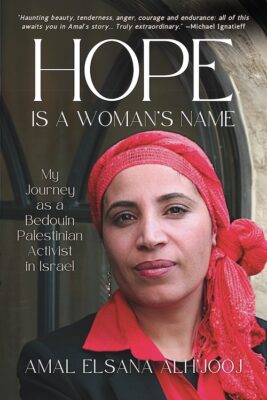Amal Elsana Alh’jooj’s memoir tells the story of building bridges in places where people struggle to imagine such a possibility, let alone the idea of a woman builder. As a Bedouin Palestinian from the desert town of Laqiya, Israel, Alh’jooj knows firsthand what it means to fight for the right of personhood, and to do it from an intersectional standpoint. Born decades into the aftermath of the Nakba, Alh’jooj overcame countless barriers to eventually obtain a PhD in Social Work at McGill, and went on to establish several grassroots organizations in order to effect change in the Global South.

Hope Is a Woman’s Name
My Journey as a Bedouin Palestinian Activist in Israel
Amal Elsana Alh’jooj
Sutherland House
$29.95
paper
432pp
9781990823770
The English translation of Amal’s name is “hope” – which, ironically, her parents chose because they wanted to have boys after her – and it was through her own activism and life’s work, fostering hope and resilience in her community, that her achievements came to fruition. For instance, after the assassination of Abu Jihad, co-founder of Fatah (a Palestinian nationalist political organization), Alh’jooj rallied her high school peers and used the sewing machines from their home economics class to sew small Palestinian flags and then wave them from the bus window after school – at a time when public display of the flag was banned. Naturally, her brazenness did not come without consequences.
Over the span of her career, from youth to adulthood, Alh’jooj has been harassed, fired from jobs, detained, sent death threats, and even had one of her community centres burned to the ground by arsonists. But the only thing that came close to stopping her was the disapproval of her family, whom she cherishes and had to defy on a regular basis in order to follow her values. In the long run, however, her family came around, and throughout her memoir, she expresses her gratitude for them, highlighting the specific roles each member played in support of her journey.
Educational theory and praxis shape Alh’jooj’s memoir as she references Paulo Freire’s Pedagogy of the Oppressed, and other scholars such as bell hooks, Hisham Sharabi, and Saad Eddin Ibraheem. The book is divided into five parts, the final of which is called “Navigating Minefields,” apt in capturing the tension that lies within its pages. While academically rigorous, the book also implements a qualitative exploration of the challenges Alh’jooj has faced on the ground in her attempts to bring education to the unrecognized Bedouin villages of Israel, where people’s survival needs are not properly met.
Another battleground Alh’jooj explores is her personal experience with IVF, postpartum depression, and the internal conflict she faced in balancing the role of motherhood with her demanding and sometimes dangerous work. Nonetheless, her optimism shines through when she becomes pregnant with twins, a girl and a boy, and thinks, “God knows that I’m too busy for another pregnancy, but also that I’m capable of raising two children at once.”
Told with courage, softened with humour, and delivered with refreshing candour, Hope is a Woman’s Name is a poignant collection of personal essays presented in narrative form and weaved with academic discourse. Alh’jooj’s memoir serves to educate, inspire, and provide nuance to complex sociopolitical issues, advocating for education and women’s rights in speaking truth to power – as well as the powerless – and then taking action.mRb






0 Comments